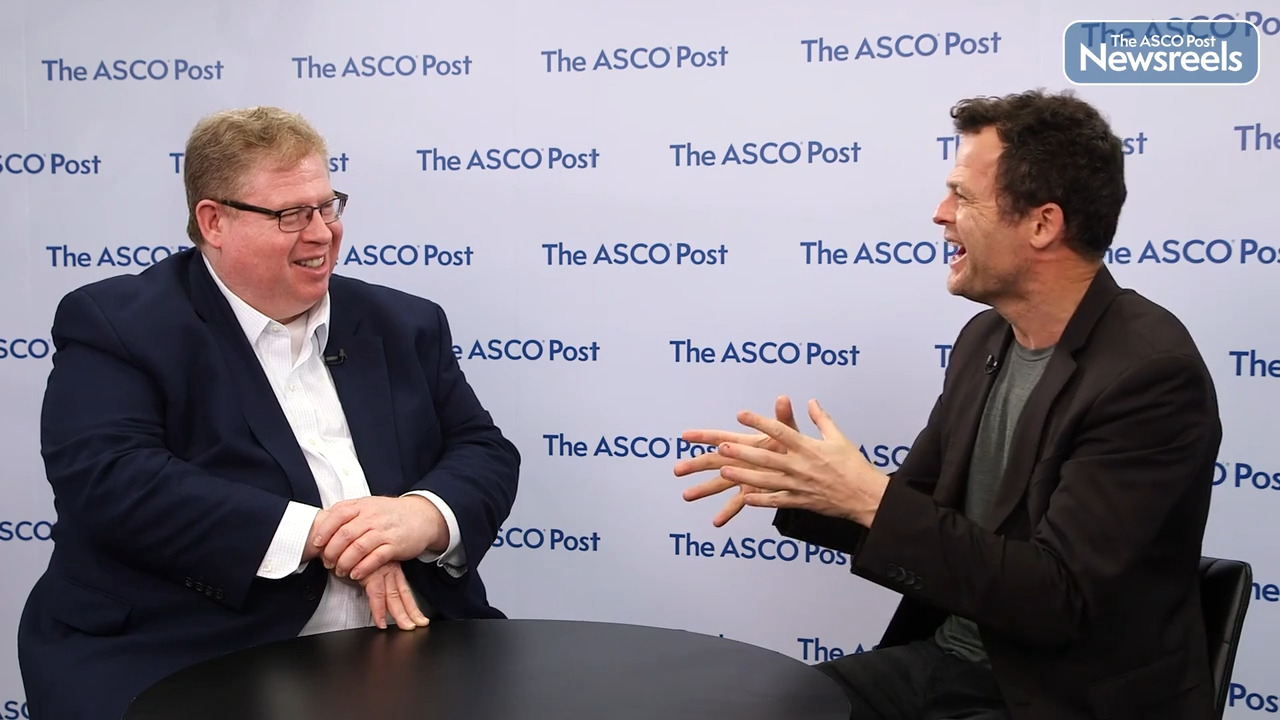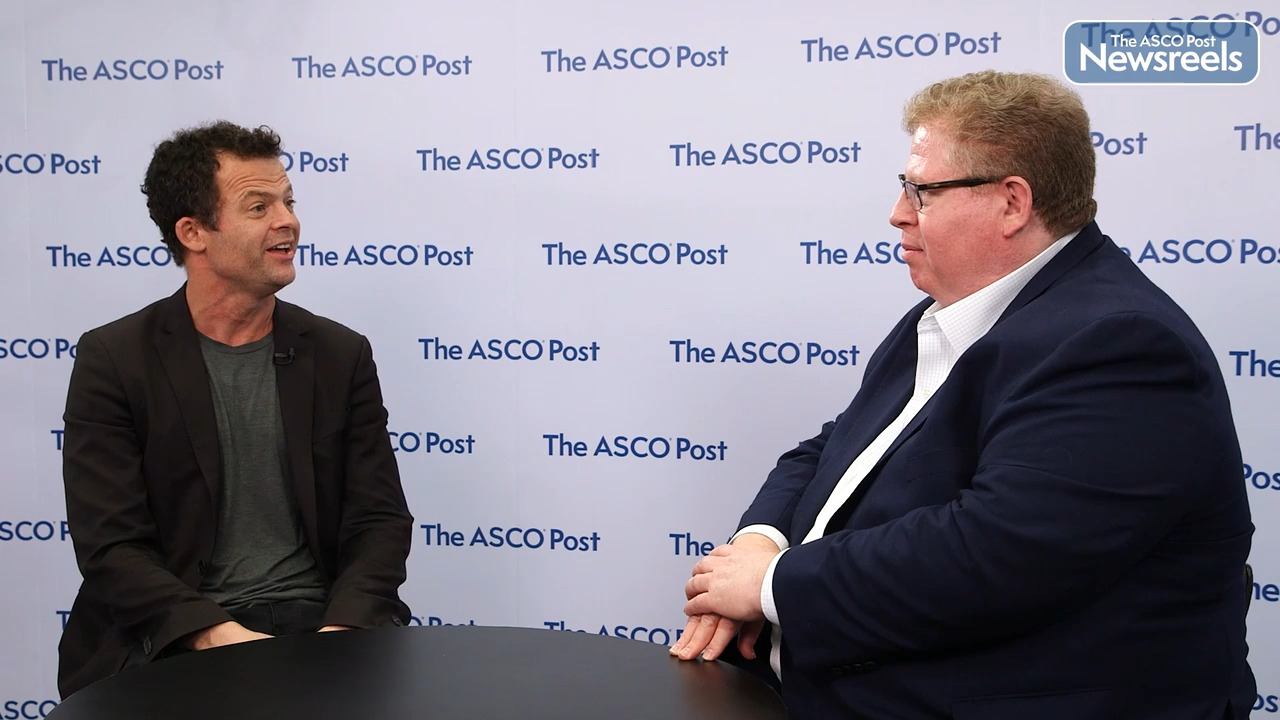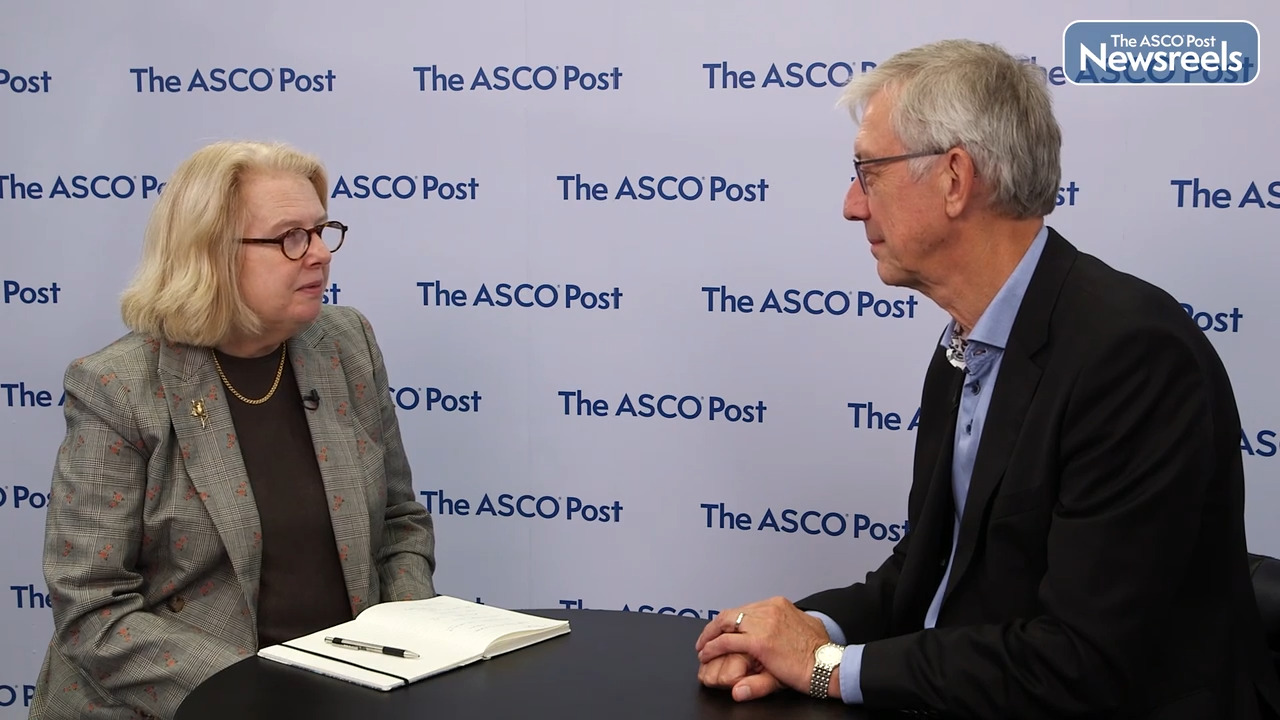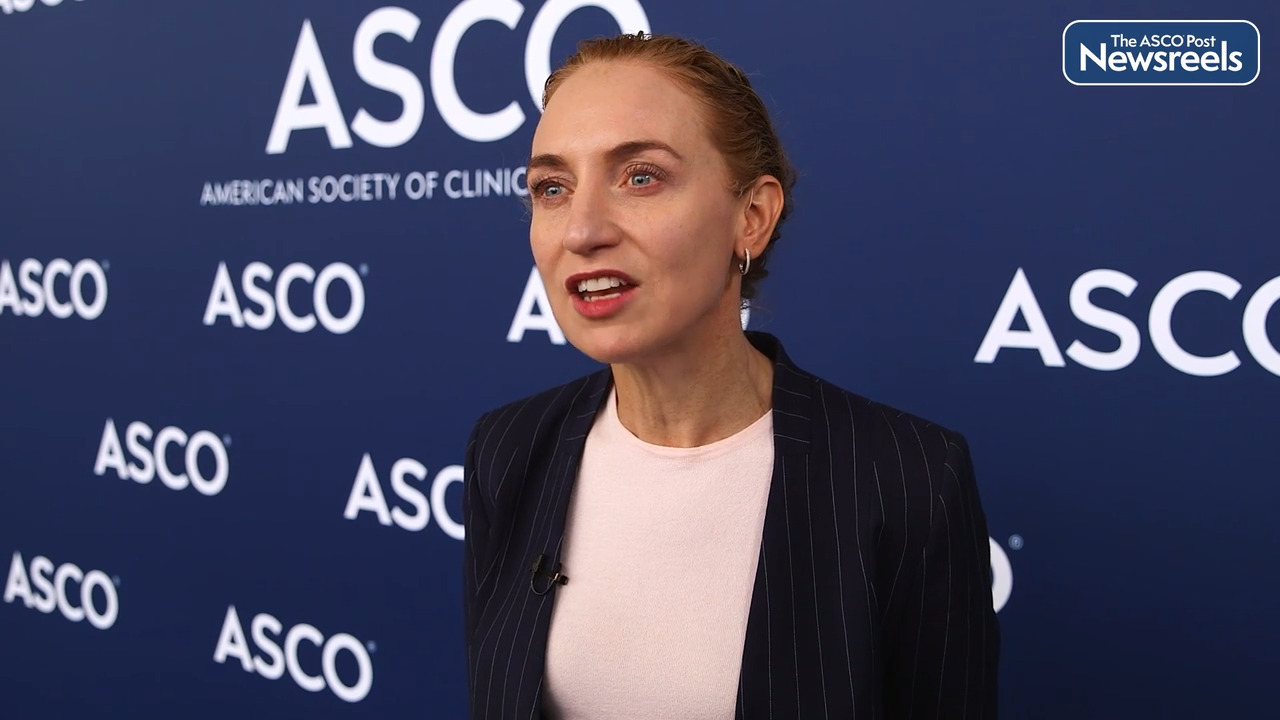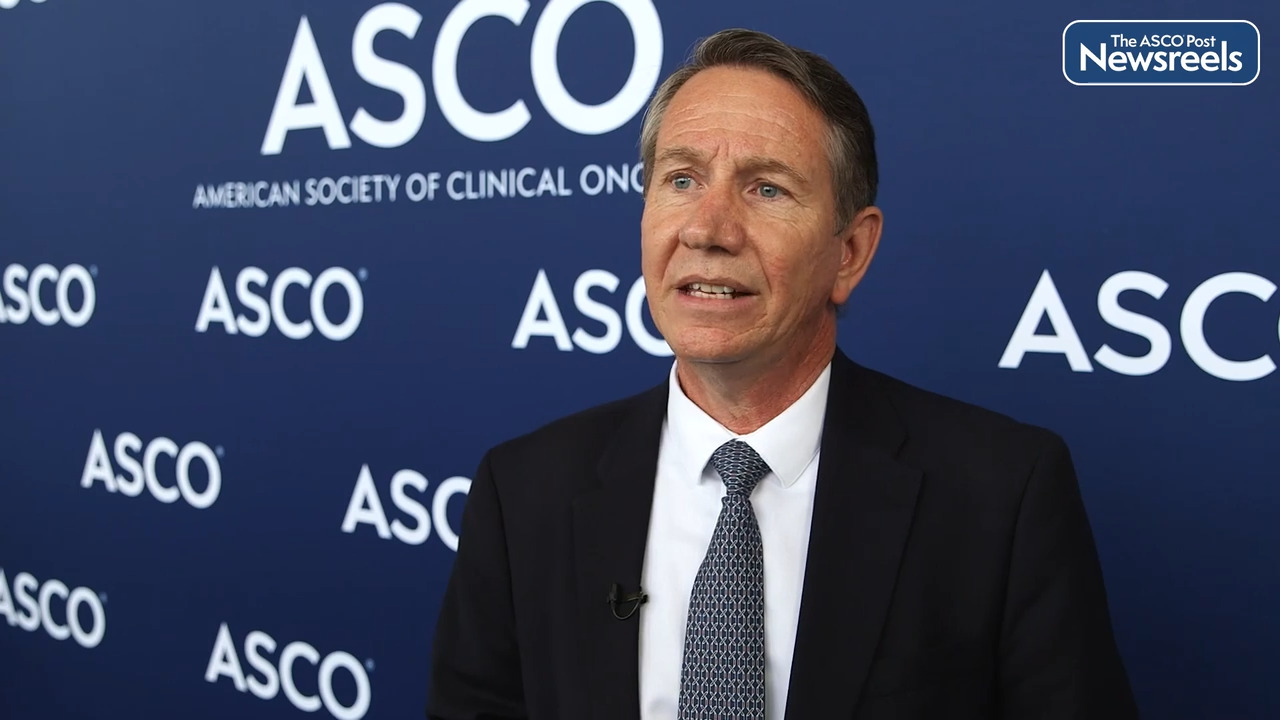Jonathan E. Rosenberg, MD, and Thomas Powles, MD, PhD, on Renal Cell Carcinoma: New Data on Pembrolizumab Plus Axitinib vs Sunitinib as First-Line Therapy
Jonathan E. Rosenberg, MD, of Memorial Sloan Kettering Cancer Center, and Thomas Powles, MD, PhD, of Barts Health NHS Trust, Queen Mary University of London, discuss phase III findings from the KEYNOTE-426 trial, which appear to support the long-term benefit of pembrolizumab plus axitinib for first-line treatment of patients with advanced clear cell renal cell carcinoma (Abstract 4513).
Thomas Powles, MD, PhD, and Jonathan E. Rosenberg, MD, on Urothelial Carcinoma: Long-Term Outcomes With Enfortumab Vedotin-ejfv vs Chemotherapy
Thomas Powles, MD, PhD, of Barts Health NHS Trust, Queen Mary University of London, and Jonathan E. Rosenberg, MD, of Memorial Sloan Kettering Cancer Center, discuss the 24-month findings from the phase III EV-301 trial, which suggest that enfortumab vedotin-ejfv continues to show a significant and consistent survival advantage over standard chemotherapy in patients with previously treated advanced urothelial carcinoma (Abstract 4516).
Ursula A. Matulonis, MD, and Ignace Vergote, MD, PhD, on Cervical Cancer: Interim Results on Tisotumab Vedotin-tftv Plus Pembrolizumab
Ursula A. Matulonis, MD, of Dana-Farber Cancer Institute, and Ignace Vergote, MD, PhD, of Belgium’s University Hospitals Leuven, discuss interim safety and efficacy results from a third dose-expansion cohort evaluating first-line tisotumab vedotin-tftv plus pembrolizumab in patients with recurrent or metastatic cervical cancer. Data on the combination showed durable antitumor activity with a manageable safety profile (Abstract 5507).
Ramucirumab/Pembrolizumab vs Standard of Care in Patients With Advanced NSCLC Previously Treated With Immune Checkpoint Inhibitors
In the phase II Lung-MAP substudy S1800A presented at the 2022 ASCO Annual Meeting (Abstract 9004) and simultaneously reported in the Journal of Clinical Oncology, Karen L. Reckamp, MD, and colleagues found that the combination of ramucirumab and pembrolizumab improved overall survival vs...
Immunotherapy Combination in Newly Diagnosed Glioblastoma
A novel combination of two experimental cancer immunotherapy agents along with an immune checkpoint blocker elicited robust immune responses in patients with newly diagnosed glioblastoma brain tumors, according to a presentation of interim, 2-year follow-up clinical trial data given by David...
Three-Arm First-Line Chemoimmunotherapy Study in Patients With Metastatic Pancreatic Cancer
Combinations of chemotherapy and immunotherapy showed activity in patients with metastatic pancreatic cancer, according to findings from a national, randomized clinical trial led and sponsored by the Parker Institute for Cancer Immunotherapy. The results of the small trial were presented by Padrón...
Georgina V. Long, MD, PhD, on Melanoma: Distant Metastasis–Free Survival With Adjuvant Pembrolizumab
Georgina V. Long, MD, PhD, of the Melanoma Institute Australia, The University of Sydney, discusses phase III findings from the KEYNOTE-716 study. The trial showed that compared with placebo, adjuvant pembrolizumab significantly improved distant metastasis–free survival in patients with resected stage IIB and IIC melanoma. The findings also suggest a continued reduction in the risk of recurrence and a favorable benefit-risk profile (Abstract LBA9500).
Stephen M. Ansell, PhD, MD, on Hodgkin Lymphoma: An Updated Analysis on First-Line Brentuximab Vedotin Plus Chemotherapy
Stephen M. Ansell, PhD, MD, of Mayo Clinic, discusses updated data from the ECHELON-1 trial, which showed that, when administered to patients with stage III or IV classical Hodgkin lymphoma, the combination of brentuximab vedotin, doxorubicin, vinblastine, and dacarbazine (A+AVD) vs doxorubicin, bleomycin, vinblastine, and dacarbazine resulted in a 41% reduction in the risk of death. These outcomes, says Dr. Ansell, confirm A+AVD as a preferred option for previously untreated disease (Abstract 7503).
Neoadjuvant Immunotherapy May Improve Survival for Patients With Soft-Tissue Sarcoma
In a phase II clinical trial, immune checkpoint blockade before surgery was associated with favorable responses and outcomes in undifferentiated pleomorphic sarcoma (UPS) and recurrent dedifferentiated liposarcoma (DDLPS), Keung et al reported at the 2022 ASCO Annual Meeting (Abstract LBA11501)....
'Unprecedented' 100% of First 14 Untreated Patients With Rectal Cancer Respond to PD-1 Blocker Dostarlimab-gxly
Rarely, if ever, has one abstract presented at the ASCO Annual Meeting warranted its own session—but that happened with a small but mighty study from Memorial Sloan Kettering. In a study of patients with locally advanced mismatch repair–deficient (dMMR) rectal cancer, 6 months of treatment with the ...
Nemvaleukin Alfa Alone and in Combination With Pembrolizumab for Advanced-Stage Solid Tumors
Initial results from the ARTISTRY-1 study to be presented by Vaishampayan et al at the 2022 ASCO Annual Meeting showed that an experimental drug called nemvaleukin alfa, when used alone or in combination with pembrolizumab, may be effective in treating several types of late-stage cancers in some...
Nimotuzumab May Improve Overall Survival in Patients With KRAS Wild-Type Advanced Pancreatic Cancer
The addition of nimotuzumab, an EGFR-targeting monoclonal antibody, to gemcitabine increased overall survival in patients with KRAS wild-type advanced pancreatic cancer, particularly those who did not need surgery for obstruction of a pancreatic bile duct, according to data from the phase III...
Addition of Adebrelimab to Carboplatin/Etoposide in First-Line Treatment of Extensive-Stage SCLC
In a Chinese phase III trial (CAPSTONE-1) reported in The Lancet Oncology, Jie Wang, MD, PhD, and colleagues found that the addition of adebrelimab, a novel anti–PD-L1 antibody, to carboplatin and etoposide significantly improved overall survival as a first-line treatment for patients with...
A Leader in Oncology Balances Philosophy, Medicine, and Humility
"The reality is that closure is a myth. My personal and professional experience with those who have lost friends and family, including children, has taught me that going on with life is not the same as gaining closure. The wound of loss is a part of each person’s life forever,” wrote...
FDA Approves Two Nivolumab-Based Regimens as First-Line Treatments for Unresectable Advanced or Metastatic Esophageal Squamous Cell Carcinoma
On May 27, 2022, the U.S. Food and Drug Administration (FDA) approved the following for the first-line treatment of patients with advanced or metastatic esophageal squamous cell carcinoma: Nivolumab (Opdivo) in combination with fluoropyrimidine- and platinum-based chemotherapy Nivolumab in...
FDA Approves Tisagenlecleucel for Adult Patients With Relapsed or Refractory Follicular Lymphoma
On May 28, the U.S. Food and Drug Administration (FDA) granted accelerated approval to the chimeric antigen receptor (CAR) T-cell therapy tisagenlecleucel (Kymriah) for the treatment of adult patients with relapsed or refractory follicular lymphoma after two or more lines of systemic therapy....
Neoadjuvant Nivolumab Plus Chemotherapy in Resectable Stage IIIA NSCLC: Overall Survival and Biomarker Analyses
In analyses from a Spanish phase II trial (NADIM) reported in the Journal of Clinical Oncology, Provencio et al found a high rate of 3-year overall survival in patients with operable stage IIIA non–small cell lung cancer (NSCLC) who received neoadjuvant nivolumab plus chemotherapy. Survival was...
Addition of Tiragolumab to Atezolizumab in PD-L1–Positive NSCLC
In a phase II trial (CITYSCAPE) reported in The Lancet Oncology, Byoung Chul Cho, MD, and colleagues found that the addition of tiragolumab, an inhibitor of the immune checkpoint molecule TIGIT, to atezolizumab improved objective response rate and progression-free survival in first-line treatment...
ASCO Guideline Rapid Update Addresses the Use of Neoadjuvant Pembrolizumab in High-Risk Early-Stage Triple-Negative Breast Cancer
A rapid update to the ASCO Guideline on neoadjuvant therapy for breast cancer adds a recommendation on the use of pembrolizumab in patients with high-risk early-stage triple-negative breast cancer.1 The update follows a recent analysis from the randomized phase III KEYNOTE-522 trial that showed a...
Expert Point of View: David Paul Carbone, MD, PhD
“Progress in lung cancer happens by slow steps punctuated by quantum leaps. In the age of perioperative therapies, we are moving one step closer to curing more patients. Surgery is still the intervention most likely to cure patients with earlier-stage disease, but 50% of cases can recur,” said...
CheckMate 816: Neoadjuvant Nivolumab Plus Chemotherapy Improves Event-Free Survival Over Chemotherapy Alone in Resectable NSCLC
The combination of neoadjuvant nivolumab plus chemotherapy achieved statistically significant and clinically meaningful improvement in event-free survival vs chemotherapy alone (P = .005) in patients with resectable non–small cell lung cancer (NSCLC, stage IB–IIIA), according to the results of the ...
PD-1 Inhibition in First-Line Treatment of Advanced Esophageal Squamous Cell Carcinoma: More to Come on New Paradigm
Esophageal cancer is associated with significant morbidity and mortality worldwide, with more than 600,000 new cases and 540,000 deaths in 2020. The squamous cell histology comprises nearly 90% of cases globally, despite its steady decline in the United States over the past 40 years. Historically,...
Overall Survival Benefit With Nivolumab Plus Chemotherapy or Ipilimumab vs Chemotherapy Alone in Esophageal Squamous Cell Carcinoma
As reported in The New England Journal of Medicine by Yuichiro Doki, MD, of Osaka University Graduate School of Medicine, Japan, and colleagues, the phase III CheckMate 648 trial has shown improved overall survival with nivolumab combined with chemotherapy or ipilimumab vs chemotherapy alone in...
Pembrolizumab for MSI-H/dMMR Advanced Endometrial Carcinoma
On March 21, 2022, pembrolizumab was approved for patients with advanced endometrial carcinoma that is microsatellite instability–high (MSI-H) or mismatch repair–deficient (dMMR), as determined by a U.S. Food and Drug Administration (FDA)-approved test, who have disease progression following prior...
Expert Point of View: Edward B. Garon, MD
Invited discussant of the NeoCOAST trial, Edward B. Garon, MD, Professor of Medicine and Director of the Thoracic Oncology Program at David Geffen School of Medicine at the University of California Los Angeles, praised the study: “NeoCOAST is an impressive study that showed numerical benefit when...
Novel Neoadjuvant Therapy May Boost Response in Resectable NSCLC
Use of multiple immune pathway inhibitors appears to be superior to checkpoint inhibitor therapy alone as neoadjuvant therapy for resectable non–small cell lung cancer (NSCLC), according to the results of the phase II NeoCOAST trial presented at the American Association for Cancer Research (AACR)...
Mario Sznol, MD, and Stefania Scala, MD, on Improving Responses to Immunotherapy in Patients With Melanoma
Invited study discussant of the use of ipilimumab plus nivolumab in resistant melanoma, at the AACR Annual Meeting 2022, Mario Sznol, MD, of Yale University Cancer Center, indicated that the substantial increase in progression-free survival at 6 months was not maintained. “The durable...
Approaches to Potentiate Immune Response in Patients Who Do Not Respond to Anti–PD-1 Therapy for Melanoma
A sizable proportion of patients with advanced melanoma will experience disease progression on anti–PD-1 therapy, and the optimal treatment of such patients represents an unmet need. Two studies presented at the American Association for Cancer Research (AACR) Annual Meeting 2022 explored separate...
Longer Follow-up Shows Adjuvant Immunotherapy After Bladder Cancer Surgery May Be Associated With Reduced Disease Recurrence
Treatment with the anti–PD-1 therapy nivolumab after surgery helped reduce cancer recurrence in patients with urothelial cancer of the bladder or other sites in the urinary tract that had invaded the muscle and therefore posed a high risk for recurrence, according to clinical trial results...
Report Investigates Potential Causes of Decreasing Responses to CAR T-Cell Therapy in Patients With Non-Hodgkin Lymphoma
A study published by Jackson et al in Cancer Discovery investigated the reasons for decreased remission rates for patients with non-Hodgkin lymphoma treated with chimeric antigen receptor (CAR) T-cell therapy. "CAR T-cell therapy is a promising treatment for non-Hodgkin lymphoma, especially for...
Anti–CTLA-4 Antibody–Based Treatment in Patients With Metastatic Melanoma Experiencing Disease Progression on Relatlimab/Nivolumab
In a study reported as a letter to the editor in The New England Journal of Medicine, Alexander M. Menzies, MD, and colleagues found that patients with metastatic melanoma who had progressive disease while receiving relatlimab/nivolumab had poor responses to anti–CTLA-4–based treatment. As noted...
Report Finds Targeting IL-6 May Help to Relieve Immunotherapy Side Effects
Researchers at The University of Texas MD Anderson Cancer Center have identified a novel strategy to reduce immune-related adverse events caused by immunotherapy by targeting the cytokine interleukin-6 (IL-6). The study, published by Hailemichael et al in Cancer Cell, establishes a proof of concept ...
Rehospitalization and Emergency Department Visits After CAR T-Cell Therapy in Commercially Insured Patients With Cancer
In a single-institution study reported in a research letter in JAMA Oncology, Kenzik et al found substantial rates of rehospitalization and emergency department visits after chimeric antigen receptor (CAR) T-cell therapy among commercially insured patients with cancer. Study Details The study...
Ipilimumab/Nivolumab in Patients With Metastatic Pancreatic or Biliary Cancer and HRD Pathogenic Germline Variants
In a single-institution case series reported in a research letter in JAMA Oncology, Terrero et al found that the combination of ipilimumab and nivolumab was active in patients with chemotherapy-refractory metastatic pancreatic or biliary cancer with homologous recombination deficiency (HRD)...
Second-Line Tislelizumab vs Chemotherapy for Advanced Esophageal Squamous Cell Carcinoma
In the phase III RATIONALE-302 trial reported in the Journal of Clinical Oncology, Shen et al found that the anti–PD-1 antibody tislelizumab significantly improved overall survival vs chemotherapy in the second-line treatment of patients with advanced or metastatic esophageal squamous cell...
DESTINY-Lung01: Is Trastuzumab Deruxtecan the Answer for HER2-Mutant Lung Cancer?
The human epidermal growth factor (HER) family of receptors are a well-established therapeutic target. Indeed, seminal studies conducted nearly 2 decades ago identified a key association between activating mutations in the kinase domain of the epidermal growth factor receptor (EGFR, also known as...
DESTINY-Lung01: T-DXd Shows Durable Activity in Previously Treated Metastatic HER2-Mutant NSCLC
In a phase II trial (DESTINY-Lung01) reported in The New England Journal of Medicine, Bob T. Li, MD, PhD, MPH, of the Thoracic Oncology and Early Drug Development Service, Memorial Sloan Kettering Cancer Center, New York, and colleagues found that fam-trastuzumab deruxtecan-nxki (T-DXd) showed...
TUXEDO-1: Efficacy of T-DXd for Patients With HER2-Positive Breast Cancer and Active Brain Metastases
In the single-center phase II TUXEDO-1 trial of patients with advanced HER2-positive breast cancer, fam-trastuzumab-deruxtecan-nxki (T-DXd) showed efficacy in patients with active brain metastases, yielding intracranial responses in 73.3% of the population and a median progression-free survival of...
Natural Killer Cells Precomplexed With Innate Cell Engager Show Activity in CD30-Positive Lymphoma
Natural killer (NK) cells derived from donated umbilical cord blood, activated with a novel bispecific antibody targeting CD16A and CD30 known as AFM13, have yielded responses in patients with pretreated and refractory CD30-positive lymphoma. The overall response rate was 89%, with 53% complete...
Nivolumab and Salvage Nivolumab/Ipilimumab for Previously Untreated Advanced Clear Cell Renal Cell Carcinoma
In a phase II trial (Hoosier Cancer Research Network GU16-260) reported in the Journal of Clinical Oncology, Michael B. Atkins, MD, and colleagues found that nivolumab monotherapy was active in previously untreated patients with advanced clear cell renal carcinoma, particularly among those with...
Hematologic Oncology 2021–2022 Almanac
Ongoing evaluation of novel, targeted, and immunotherapies has led to exciting advances across the array of hematologic malignancies over the past year. The availability of new treatment options, along with emerging data on novel combinations and sequencing approaches, is rapidly changing...
Bispecific Antibodies With Multiple Targets Moving Forward in Multiple Myeloma
Poor outcomes are observed in patients with myeloma who are refractory to multiple classes of therapies, with the average patient experiencing disease progression in up to 6 months and living no longer than 6 to 15 months. Patients often rapidly cycle through regimens that use less effective or...
MAIA Trial: Daratumumab Added to Lenalidomide Plus Dexamethasone Improves Overall Survival in Transplant-Ineligible Multiple Myeloma
As reported in The Lancet Oncology by Thierry Facon, MD, of the Centre Hospitalier Universitaire de Lille, and colleagues, a prespecified interim analysis of overall survival in the pivotal phase III MAIA trial has shown a significant benefit with the addition of daratumumab to...
Maintenance Daratumumab Prolongs Progression-Free Survival in Newly Diagnosed Multiple Myeloma
As reported in The Lancet Oncology by Philippe Moreau, MD, of the University Hospital Hôtel-Dieu, Nantes, and colleagues, an interim analysis of part 2 of the phase III CASSIOPEIA trial has showed significantly prolonged progression-free survival with maintenance daratumumab vs observation...
Subcutaneous Daratumumab Added to Pomalidomide Plus Dexamethasone Improves Progression-Free Survival in Multiple Myeloma
As reported in The Lancet Oncology by Meletios A. Dimopoulos, MD, of the National and Kapodistrian University of Athens, and colleagues, the phase III APOLLO trial has shown significantly improved progression-free survival with the addition of subcutaneous (SC) daratumumab to oral...
BCMA-Directed CAR T-Cell Therapy Ciltacabtagene Autoleucel in Relapsed or Refractory Multiple Myeloma
In the phase Ib/II CARTITUDE-1 trial reported in The Lancet, Jesus G. Berdeja, MD, and colleagues found that ciltacabtagene autoleucel (cilta-cel), a chimeric antigen receptor (CAR) T-cell therapy with two B-cell maturation antigen (BCMA)-targeting single-domain antibodies, produced a high rate of...
BELINDA Trial: CAR T-Cell Therapy Fails to Improve Outcomes in Aggressive Non-Hodgkin Lymphoma
The autologous chimeric antigen receptor (CAR) T-cell therapy tisagenlecleucel failed to improve event-free survival vs standard-of-care treatment strategies in patients with aggressive, relapsed or refractory non-Hodgkin lymphoma (NHL), according to results of the phase III BELINDA trial,...
Expert Point of View: Laurie H. Sehn, MD, MPH
The moderator of the session, Laurie H. Sehn, MD, MPH, Clinical Professor at the BC Cancer Centre for Lymphoid Cancer and University of British Columbia, Vancouver, Canada, called the results of the TRANSFORM trial “quite remarkable” and said chimeric antigen receptor (CAR) T-cell therapy has the...
TRANSFORM: Lisocabtagene Maraleucel Improves Outcomes in Relapsed or Refractory Large B-Cell Lymphoma
Chimeric antigen receptor (CAR) T-cell therapy with lisocabtagene maraleucel could prove to be the new standard-of-care treatment for patients with relapsed or refractory large B-cell lymphoma in the second-line setting, according to data presented at the 2021 American Society of Hematology (ASH)...
Consolidation Durvalumab Alone or Combined With Oleclumab or Monalizumab for Unresectable Stage III NSCLC
In an interim analysis of the phase II COAST trial reported in the Journal of Clinical Oncology, Roy S. Herbst, MD, PhD, FACP, FASCO, and colleagues found that consolidation durvalumab in combination with the anti-CD73 antibody oleclumab or anti-NKG2A antibody monalizumab both improved objective...
